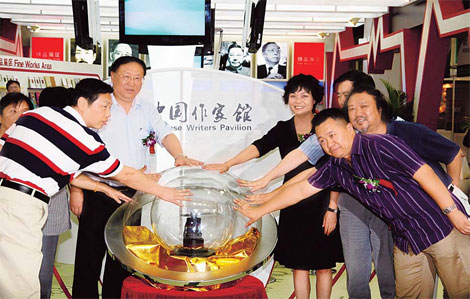Getting the word out
Writers and publishers engage in much hand-wringing while pondering ways to get the world to read the nation's authors at a recent book fair.
 |
|
Chinese writers attend the opening ceremony of the Chinese Writers Pavilion at the 17th Beijing International Book Fair. [China Daily] |
Writer Guo Xuebo was astonished when a foreign reporter asked why China had so many writers at the Frankfurt Book Fair last year. "The journalist was referring to the more than 100 members of the Chinese Writers' Association (CWA) delegation," Guo says. "But he would be even more taken aback had he known that the registered members of the CWA stand at more than 9,000."
Publisher Pan Kaixiong says he was disappointed to only see books by two mainland writers - Mo Yan and Zhang Jie - on the shelves reserved for China in German bookstores. Most of the books were by Chinese writers living overseas.
Figuring out how to make Chinese literature accessible to a wider overseas audience, while at the same time bringing diverse works from abroad to China, emerged as a hot discussion topic at the recently concluded 17th Beijing International Book Fair.
Writer Bi Feiyu, whose The Moon Opera and Three Sisters have been translated into many languages, believes it is both the best of times and the worst of times for Chinese literature to reach out to the world.
"China is drawing the world's attention with the takeoff of its economy, but at the same time, people throughout the world have lost the passion for reading, " he says.
"While I have encountered many China lovers or Chinese-literature enthusiasts in Paris and New York, publishing Chinese literature is perhaps still not that lucrative for foreign publishers."
Huang Guorong, deputy secretary-general of the Publishers Association of China, suggests four reasons for the lukewarm response to Chinese literature in the global market. These are the ideological prejudice of the West, the inherent problems in Chinese literature (such as the fact that most works are set in the past rather than in the present), the lack of capable translators and insufficient publicity.
He remembers how foreign publishers turned down his recommendation of Mo Yan's Red Sorghum when he was working for a publishing house years ago. "Maybe it is not exactly prejudice but, rather, a sheer lack of knowledge," he says.
Pan points to the shifting focus in publishing; "Foreign publishers used to go for works by so-called dissidents, while they are increasingly asking for recommendations of fiction that reflects contemporary social life."
Pan agrees with Huang's observation of the lack of competent translators. According to him, foreign publishers prefer native speakers of the target audience when choosing literary translators. But take Germany, for instance; there are fewer than 10 Chinese-German literary translators, Goethe Institute China director Michael Kahn-Ackermann says.
Pan adds that there is also an urgent need for more professionals working in copyright trading.
For Huang, one major problem in Chinese literature is that writers have not done enough to reveal the soul of the nation.
"Before the founding of the New China in 1949, Lu Xun (1881-1936) was the voice of China, and Ah-Q (the main character in The Real Story of Ah-Q) was representative of the Chinese masses. But now, who is the voice of the country and which character is representative of the people?"
A literary colossus, Lu was known for his incisive insights into the nation's social and political ills and for his pioneering achievements in using the colloquialism as a literary language.
Writer Li Mingsheng echoes Huang, saying that today's Chinese writers still have a long way to go before they can produce works like Dream of the Red Chamber, or attaining the kind of influence that the May 4th writers had.
Writer Wang Xiaofang, whose novel Notes of a Civil Servant is currently undergoing translation, attributes interest in his novel to the genre and his innovative style.
"In terms of genre, my book is what critics call the cultural-political novel. In terms of style, it is a collage of 10 short stories and one novella."
Writer Xu Xiaobin, whose Dunhuang Dreams and Feathered Serpent are available in English, believes books about the mysteries of human nature and the destiny of mankind have universal appeal and can touch people from diverse cultures and backgrounds.
 0
0 






